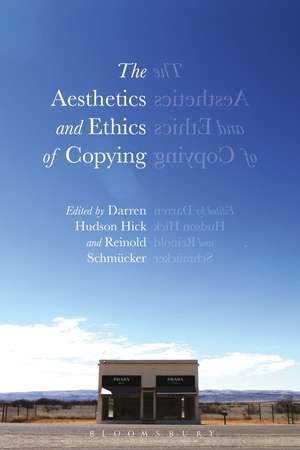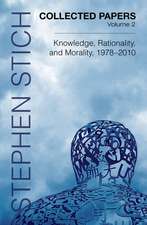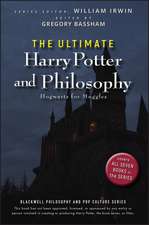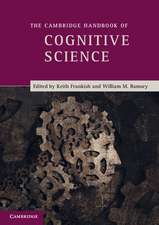The Aesthetics and Ethics of Copying
Editat de Professor Darren Hudson Hick, Reinold Schmückeren Limba Engleză Paperback – 27 dec 2017
| Toate formatele și edițiile | Preț | Express |
|---|---|---|
| Paperback (1) | 242.61 lei 43-57 zile | |
| Bloomsbury Publishing – 27 dec 2017 | 242.61 lei 43-57 zile | |
| Hardback (1) | 602.50 lei 43-57 zile | |
| Bloomsbury Publishing – 19 oct 2016 | 602.50 lei 43-57 zile |
Preț: 242.61 lei
Preț vechi: 275.32 lei
-12% Nou
Puncte Express: 364
Preț estimativ în valută:
46.44€ • 50.46$ • 39.03£
46.44€ • 50.46$ • 39.03£
Carte tipărită la comandă
Livrare economică 21 aprilie-05 mai
Preluare comenzi: 021 569.72.76
Specificații
ISBN-13: 9781350056077
ISBN-10: 1350056073
Pagini: 432
Ilustrații: 1 b/w illustration
Dimensiuni: 234 x 158 x 24 mm
Greutate: 0.6 kg
Ediția:NIPPOD
Editura: Bloomsbury Publishing
Colecția Bloomsbury Academic
Locul publicării:London, United Kingdom
ISBN-10: 1350056073
Pagini: 432
Ilustrații: 1 b/w illustration
Dimensiuni: 234 x 158 x 24 mm
Greutate: 0.6 kg
Ediția:NIPPOD
Editura: Bloomsbury Publishing
Colecția Bloomsbury Academic
Locul publicării:London, United Kingdom
Caracteristici
Includes an international team of scholars from philosophy of art, philosophy of technology, philosophy of law, ethics, legal theory, media studies, art history, literary theory, and sociology
Notă biografică
Darren Hudson Hick is a Visiting Assistant Professor of Philosophy at Texas Tech University, USA. He is the author of numerous articles on issues in copyright and the ontology of art and Introducing Aesthetics and the Philosophy of Art (2012).Reinold Schmücker is a Professor of Philosophy at Westfälische Wilhelms-Universität in Münster, Germany. He is the author of Was ist Kunst? Eine Grundlegung [What Is Art? A Foundation] (1998; Revised Edition, 2014) and editor of several German language collected volumes on aesthetics and the philosophy of art.
Cuprins
List of FiguresList of TablesContributorsPrefacePart I: The Copying Animal: Exploring the Cultural Value of Copying1. Copying and the Limits of Substitutability, Dieter Birnbacher2. Deep Copy Culture, Mark Alfino3. Imitation and Replication of Technologies: The Prospects for an Evolutionary Ethics of Copying, Wybo HoukesPart II: What is a Copy? Conceptual Perspectives4. What Is the Object in Which Copyright Can Subsist? An Ontological Analysis, Maria Elisabeth Reicher5. What Is an Artifact Copy? A Quadrinomial Definition, Amrei Bahr6. Are Counterfeits Copies?, Massimiliano Carrara7. The Nature of Copying and the Singular Literary Work, Darren Hudson HickPart III: The Copying Artist: Aesthetic and Ethical Challenges8. Illegitimate Legitimate Copies: A Grey Area in Dealing with Literary Works, Annette Gilbert9. Appropriating Fictional Characters, James O. Young10. Plagiarizing Nonfiction: Legal Cases, Aesthetic Questions, and the Rules of Copying, David Oels11. Appropriation and Derogation: When Is It Wrong to Appropriate?, Lisa Jones12. The Paradox of Style as a Concept of Art, Jan Bäcklund13. Blurred Lines: A Case Study on the Ethics and Aesthetics of Copying, Eberhard OrtlandPart IV: Freedom for All? Towards an Ethics of Copying for the Digital Age14. The Ethics of Copyright and droit d'auteur - An Outline, Thomas Dreier15. Self-Copying and Copyright, Lionel Bently16. Ethical Approaches for Copying Digital Artifacts: What Would the Exemplary Person [junzi] / a Good Person [phronemos] Say?, Charles Ess17. Ethics, Evolved: An International Perspective on Copying in the Networked Age, Aram Sinnreich18. Online Piracy and the Transformation of the Audiences' Practices: The Case of the Czech Republic, Jakub Macek and Pavel Zahrádka19. Normative Resources and Domain-specific Principles: Heading for an Ethics of Copying, Reinold SchmückerCoda20. In Defence of Disco Edits, Hans NieswandtIndex
Recenzii
The Aesthetics and Ethics of Copying brings together an interdisciplinary field of scholars to answer the most pressing philosophical questions about copies and copying from a contemporary perspective. This is a fantastic collection.
For too long lawyers and legislatures have accepted a loose consensus on the nature and purpose of the 'intangible things' that are regulated by copyright law. The lawyerly consensus now suffers from slippage as legislative and treaty developments put unexpected pressures on existing concepts. The instant volume, The Aesthetics and Ethics of Copying, addresses crucial questions of definition, aesthetic experience, and copyright policy, and employs the kind of philosophic rigor that the field increasingly needs. I recommend this set of fascinating readings very highly.
This is an immensely helpful and timely volume, richly problematizing the concept of the copy and the act of copying from a variety of perspectives, disciplines and normative commitments, thus clearly establishing the need to think beyond copies as mere instances of economic value in the marketplace of intangibles. Obligatory, rewarding and enjoyable reading for anyone interested in intellectual property and/or its relation to broader cultural concerns.
Engaging with a plethora of topics, the discussions here tend to avoid abstract meanderings and opt instead to touch ground and stay there, incorporating and taking seriously empirical data and the details of both legal and artworld practices. This volume ...would be of benefit both to those who are working outside of philosophy but seeking further conceptual clarity on these issues and to those who are working within philosophy but are interested in exploring further potential applications of their work.
A landmark contribution to the philosophical literature on this subject...This collection of essays is valuable to scholars not only because the essays are of such high quality, but because it demonstrates the rewards to be reaped by such a boldly interdisciplinary approach to its subject.
The volume . compiles original essays by not just philosophers, but also scholars working in fields such as art history, communication studies, legal studies, literary studies, media studies, and sociology -- as well as one professional DJ ... While most of the essays are philosophical, the authors do not limit themselves to engaging only with the tradition of analytic -- or even broadly Western -- philosophy. Among the noteworthy achievements of this volume, then, is its truly interdisciplinary nature . To sum up: this is a volume of significant merit. It should be read by anyone interested in aesthetic, cultural, ethical, legal, or ontological considerations pertaining to copying, broadly construed.
For too long lawyers and legislatures have accepted a loose consensus on the nature and purpose of the 'intangible things' that are regulated by copyright law. The lawyerly consensus now suffers from slippage as legislative and treaty developments put unexpected pressures on existing concepts. The instant volume, The Aesthetics and Ethics of Copying, addresses crucial questions of definition, aesthetic experience, and copyright policy, and employs the kind of philosophic rigor that the field increasingly needs. I recommend this set of fascinating readings very highly.
This is an immensely helpful and timely volume, richly problematizing the concept of the copy and the act of copying from a variety of perspectives, disciplines and normative commitments, thus clearly establishing the need to think beyond copies as mere instances of economic value in the marketplace of intangibles. Obligatory, rewarding and enjoyable reading for anyone interested in intellectual property and/or its relation to broader cultural concerns.
Engaging with a plethora of topics, the discussions here tend to avoid abstract meanderings and opt instead to touch ground and stay there, incorporating and taking seriously empirical data and the details of both legal and artworld practices. This volume ...would be of benefit both to those who are working outside of philosophy but seeking further conceptual clarity on these issues and to those who are working within philosophy but are interested in exploring further potential applications of their work.
A landmark contribution to the philosophical literature on this subject...This collection of essays is valuable to scholars not only because the essays are of such high quality, but because it demonstrates the rewards to be reaped by such a boldly interdisciplinary approach to its subject.
The volume . compiles original essays by not just philosophers, but also scholars working in fields such as art history, communication studies, legal studies, literary studies, media studies, and sociology -- as well as one professional DJ ... While most of the essays are philosophical, the authors do not limit themselves to engaging only with the tradition of analytic -- or even broadly Western -- philosophy. Among the noteworthy achievements of this volume, then, is its truly interdisciplinary nature . To sum up: this is a volume of significant merit. It should be read by anyone interested in aesthetic, cultural, ethical, legal, or ontological considerations pertaining to copying, broadly construed.















